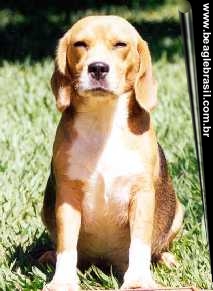This
small hound has some remarkable characteristics. The young beagle develops
a close relationship with its human family, and it's abe to show affection
for those it loves. Despite its affection, the Beagle has a strong sense of
independence, and lying in somebody's lap doesn't please him as much as games
with balls, cloths or any other activity that allows it to spend all his energy.
Eternally starving, it has a great facility to gain weight. Constant physical
activity is the best solution to this problem.The odd ones out are the puppies
with less than 4 or 5 months of age. Those ones are in a period of intense
growth and development; therefore, they need many hours of sleep and nutritious
feeding. During this period, the beagle gets easily tired with the games,
and it won't appreciate any insistence to go on.The more the beagle grows
up, the more "active" it becomes; it gets harder and harder to "turn it off".Never
allow a

Beagle to be disobedient, because the results can be catastrophic. It is worth
to remind that the beagle is, originally, a dog of packs, used to living together
with about fifty other dogs; and it will take the place of the